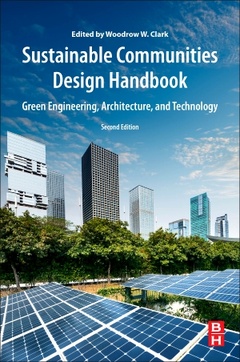Description
Sustainable Cities and Communities Design Handbook (2nd Ed.)
Green Engineering, Architecture, and Technology
Coordinator: Clark II Woodrow W.
Language: English
Subjects for Sustainable Cities and Communities Design Handbook:
Keywords
Adaptation plans and assessments; Agile energy systems; Agriculture; Biomass; Building energy efficiency; Capitalism; Carbon-neutral island; China; Clean energy; Client; Climate action plans and inventories; Climate preservation; Community ownership; Community vision; Community; Comprehensive planning; Crisis; Data response; Decarbonization; Denmark; Developing island states; Disaster resilience; Disruptive; Distributed renewable energy; District heating; Eco; ECO-GEN; Economics; Electrification; Energy efficiency; Energy; Externalities; Finance and economic development; Finance; Fossil fuels; Generator; Germany; GIR; Globalization; Government; Grassroots; Green development; Green economy; Green energy; Greenhouse gas; Grid stability; Investments; IoT; LED; Life cycle analysis; Market; Mauritius; Micro grid; Multidimensional goals; Natural capital; Nature-based solutions; Netherlands; Next economics; Northern Europe; Paradigm; Payback; Plan; Policy entrepreneurs; Policy integration; Project and program budget; Public�private partnership; Qualitative; Quantitative; Renewable energy; Renewable island; Renovation; Retrofitting; Reusable food; Revenue management; Science; Scrappy; Sierra Leone; Smart communities; Smart grid; Social equity; Solar power; Solid waste; Sustainability planning; Sustainability; Sustainable cities; Sustainable communities; Sustainable development; Sustainable mobility; Sustainable; Sweden; Tahiti; Third-generation grid; Transportation; United Nations; United States; Urban circular economy; Zero-energy building
Support: Print on demand
Description
/li>Contents
/li>Readership
/li>Biography
/li>Comment
/li>
Sustainable Communities Design Handbook: Green Engineering, Architecture, and Technology, Second Edition, brings together the major players responsible for sustainable development at both community and metropolitan scales. The book aims to explain and demonstrate the practice, planning, design, building and managing of the engineering, architectural and economic development of cities and communities to meet sustainable development objectives. Offering a holistic approach to creating sustainable communities, the book includes a 40 percent increase in new methods and technology over the last edition, and 50 percent more case studies from around the world to illustrate how common sustainability problems are solved.
As the concept and practices of a sustainable built environment have evolved over the years, it is increasingly recognized that the scope should be expanded beyond individual buildings to the community scale. Written by an international team of engineers, architects, and environmental experts this second edition includes new HVAC technologies for heating and cooling, energy effect technologies for lighting, and new construction materials which improve heating and cooling efficiencies. This new edition will also include critical updates on international codes: LEED, BREEAM, and Green Globes.
1. The Tools for Sustainable Development 2. Global Warming and Climate Change: The Mechanisms for Community Cases Toward Solutions
Part One: Architectural Design and Building in Communities 3. Public Policy: Leadership at the local, state, national and international levels 4. Government: The Case of Sustainable College Communities 5. Green Buildings: standards and codes that provide environmentally sound technologies and returns on investments
Part Two: Agile Sustainable Infrastructure Systems 6. Smart Communities: the public and private sectors integration of infrastructures, technologies and buildings 7. Technologies, Engineering and Science 8. The Environment, Land Use, Natural Resources Today 9. Economics and Accounting: Life Cycle Analysis, Externalities, Markets and ROI (return on investment) 10. Legal contracts and Power Purchase Agreements 11. Corporate Governance and Responsibility Model Sustainable Communities, Regions and Nation States 12. Global Cases of Sustainable Communities 13. Conclusions: the next generation, life styles and beyond
APPENDIX A. Sustainable Development B. Greenhouse Gas Analysis C. Demand Side Management E. Case of Legal Mechanism: The Power Purchase Agreement (PPA) F. References and Web Site Data Sources
Construction Civil Engineers, Environmental Engineers, Mechanical Engineers, and Energy Engineers
Clark is an internationally recognized, respected expert, author, lecturer, public speaker and consultant on global and local solutions to climate change. His core focus is on economics for smart green communities. During the 1990s, he was Manager of Strategic Planning for Technology Transfer at Lawrence Livermore National Laboratory (LLNL) with University of California and U.S. Department of Energy. He was one of the contributing scientists for United Nations Intergovernmental Panel Climate Change (IPCC), awarded 2007 Nobel Peace Prize and Researcher for UN FCCC.
From 2000-2003, Clark was Advisor, Renewable Energy, Emerging Technologies & Finance to California Governor Gray Davis. After the “recall in 2004, Clark founded, and manages Clark Strategic Partners (CSP), a global environmental, policy and economics renewable energy consulting firm. Also 2015-2018, Clark taught courses at University of International Relations (UIR) in Beijing and lectured on “Environment Economics Cheung Kong Graduate School of Business (April 2017). He was appointed (July 2016) to be a member of the Editorial Board for the Energy Review Journal (ERJ) in China. He was selected to be a member of the UN B20 Finance Task Force supported in 2016 by China. Clark teaches and lectures in the EU, especially Denmark and Italy.
Clark published 12 books by the end of 2017 and over 70 peer-reviewed articles, which reflect his concern for global sustainable green communities. He has authored and edited books are The Next Economics (Springer, 2012) and Global Sustainable Communities Handbo
- Explains the most cutting-edge green technologies and methods for use in built communities
- Provides a common approach in using natural resources when building and designing green communities
- Features coverage of green practices from architecture to construction
- Covers compliance with various international codes, methods and legal frameworks




